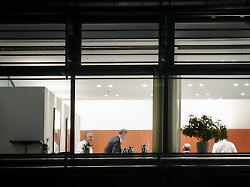Business is pushing for agreement
Traffic light tip interrupts budget talks again
December 12, 2023, 7:41 a.m
The budget crisis has still not been resolved and the leaders of the traffic light coalition are interrupting their talks again. This is causing a stir among business representatives and the impasse is causing great concern.
The leaders of the traffic light coalition interrupted their talks about the 2024 budget again late on Monday evening. It was said in government circles that progress had been made. Details were not known. Negotiations are scheduled to continue on Tuesday morning.
Chancellor Olaf Scholz, Finance Minister Christian Lindner and Vice Chancellor Robert Habeck are trying to find a solution to the budget gap caused by the Federal Constitutional Court’s ruling. It’s about a 17 billion euro hole in the 2024 budget and about enabling investments for climate protection and the modernization of the economy in the next few years. At the weekend, the SPD called for the debt brake to be suspended again, but the FDP has so far rejected this and is primarily focusing on savings.
Scholz expressed confidence on Monday that he would soon be able to present a result. The SPD chairman Lars Klingbeil is now also expecting a quick agreement. “I am confident that we will somehow fill this serious gap in the budget in the next few days,” he said in the evening on the “RTL Direkt” program. When asked whether this also included savings in the social sector, Klingbeil admitted: “We know that we as the SPD have to make our contribution. So also things that are important to us. (…) Of course, savings must be made by everyone be provided.”
“Company with patience at the end”
Leading German business associations are calling for the dispute to be resolved quickly. Employer President Rainer Dulger said that savings of 17 billion euros from a federal budget of around 470 billion euros must be possible. “We don’t have a revenue problem, we have a spending problem. We also don’t have a budget crisis, but rather a decision-making crisis with a lack of willingness to compromise,” he said. “This fuels uncertainty and only increases dissatisfaction with democracy.”
Dulger also spoke out against suspending the debt brake. The problem is not the debt brake, but rather the high expenditure and the fatigue of reforms. It’s all about prioritizing expenses wisely. “The federal budget presented for the coming year provides for more than five times as much spending on social services, personnel and interest as on investments. That is too much for consumption and too little for the future. This imbalance in the budget must be ended.”
Industry President Siegfried Russwurm also called on the coalition to find a quick and sustainable solution for the 2024 budget. There is already great uncertainty in the industry. “There is less investment in Germany. Many companies are at the end of their patience.”
The President of the German Chamber of Commerce and Industry (DIHK), Peter Adrian, made a similar statement. According to him, the federal government is in a really difficult situation. “From an economic perspective, I have to say: Due to the economic situation with high energy prices and unclear framework conditions, we have already felt a great deal of uncertainty among companies across almost all sectors.” But this has now increased again because the fiscal framework is uncertain. “Nobody currently knows where the train will go in the future. This can be seen in both the innovation climate and the investment climate in Germany.”
